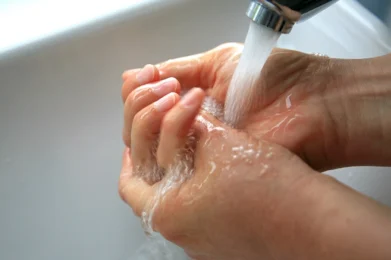In This Article:
- The two largest causes of hearing loss are noise exposure and aging. Loud noises, even in small doses, can cause hearing damage over time.
- There are three main types of hearing loss. Conductive hearing loss affects the ear canal and/or middle ear space. Sensorineural is long-term hearing loss that can be caused by noise exposure and aging. It is also possible to have mixed hearing loss, or a combination of the two.
- For conductive hearing loss, seek out an ear, nose and throat doctor to assess the condition. For sensorineural or long-term hearing loss, hearing aids are a common and useful treatment.
Did you know more than 48 million Americans struggle with hearing loss? Here’s what you need to know about hearing loss causes, symptoms and prevention — whether you’re a veteran, an older adult or a teen who loves listening to loud music.
Hearing Loss Causes
The two largest causes of hearing loss are noise exposure and aging. Loud noises, even in small doses, can cause hearing damage over time. The level of exposure and the amount of time you’re exposed are the two main ways to gauge potential damage.
If you have to shout over a sound to talk, the noise is likely more than 80 decibels. Being exposed to this sound level for more than 30 minutes can cause hearing loss over time. Sounds above 120 decibels, such as a gunshot or an airplane, can cause damage within minutes.
While noise exposure is more easily preventable, hearing loss as you get older is a part of life. There is no known single cause of hearing loss due to aging, but it’s most commonly due to wear and tear of nerve cells or hairs in the inner ear.
Types of Hearing Loss
There are three main types of hearing loss.
Conductive: Affects the ear canal or the middle ear space behind the eardrum
Sensorineural: A long-term hearing loss caused by noise exposure and aging.
Mixed: A combination of both conductive and sensorineural hearing loss.
Hearing Loss Symptoms
While mishearing a sentence on occasion is no cause for concern, substantial hearing loss is not normal and should be addressed by a doctor. Some symptoms of hearing loss might be:
- Asking for constant clarification
- Frequently not being able to understand what people are saying
- Tinnitus, or ringing of the ears
- Sensitivity to sound
- Delayed speech, especially in children
Prevention and Treatment
Knowing how to prevent hearing loss, as well as the steps to take if you’re experiencing hearing problems, can help your hearing immensely.
To prevent hearing loss in everyday situations, use hearing protection, back away from the source and lower the volume. For conductive or temporary hearing loss, seek out an ear, nose and throat doctor to assess and treat the condition. For sensorineural, long-term hearing loss, hearing aids are a common and useful treatment.
Caring for Your Ears
First, it’s important to avoid noisy environments when possible. If you don’t have control over the noise, try foam earplugs or earmuffs when mowing the lawn, using a saw or attending a concert.
Also, try to keep yourself healthy. Other chronic conditions — like diabetes and high blood pressure — can impact your hearing, so make sure to keep up with wellness checks. Research shows that the sooner you address hearing loss, the more effective hearing aids and other treatment methods will be.
Remember that hearing loss can usually only be prevented or treated— not cured. However, in cases where hearing loss onsets suddenly, an audiologist or ear, nose and throat doctor may be able to treat the issue if it’s addressed quickly. If you think you’re losing your hearing, make an appointment with a doctor and get your hearing tested right away.
Sources:
- https://www.cdc.gov/nceh/hearing_loss/what_noises_cause_hearing_loss.html
- https://www.hopkinsmedicine.org/health/conditions-and-diseases/hearing-loss/types-of-hearing-loss
- https://www.webmd.com/a-to-z-guides/hearing-loss-prevention
- https://www.hearingloss.org/wp-content/uploads/HLAA_HearingLoss_Facts_Statistics.pdf?pdf=FactStats#:~:text=Approximately%2048%20million%20Americans%20have%20some%20degree%20of%20hearing%20loss.







